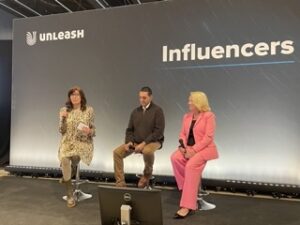Who's that Girl?
Talent Communities: They Call Me Bruce
Originally posted: March 5, 2012 on TrishMcFarlane.com
Do you remember the relatively obscure song from the 80’s called “They Call Me Bruce” buy Rick Springfield? It’s a funny bit of lyrics about how everyone gets him confused with another singer of the time, Bruce Springsteen? You know, Springfield/ Springsteen, it’s close, right? Right. Obviously I’ll do anything to throw in a Rick Springfield video….
As the song implies, using the right name for someone or something is important. Which brings me to Talent Communities. Have you heard of them? They are all the rage, and in certain circles, they are the end-all-be-all to a talent strategy. The problem arising is in referring to job candidates as talent.
You (the organization) have to be compelling in order for someone to want to join your community. Andy Headworth wrote about the use of the word talent, as in talent communities, as the real problem. Do people want to be called talent? Andy proposed they do not.
My view of the word talent is not a negative one based in reality tv. In fact, if someone tells me I have talent at something I take that as a compliment. But I do agree with Andy that language used is very important in driving traffic to your organization. Talent community availability would not make me want to affiliate with an organization if I am a job seeker or if I am even a potential job seeker in that industry in the future.
Why not just call it community?
Another issue for me is considering why I would want to associate myself in the first place? Am I automatically included if I have applied for a job at your company? If you didn’t select me, depending on how that message is communicated (if at all), I may not want to be part of your little community. The key is being able to answer those questions and to find a way to encourage engagement in conversation with your company. In order to engage your potential candidates in an ongoing manner, several key steps need to be in place:
- Have a strong command of the organization’s brand. This includes your outward facing activities with your clients and the way you relate to your employees. Does your organization know how to communicate this effectively? Is there anything positve to communicate? Don’t start outreach on a large scale until you have this key component in place.
- Use your marketing skills. Who is your target demographic? Don’t just throw a bunch of darts at a wall, make precise and targeted attempts to reach the specific people in the industry who will be most likely to help your organization reach your business goals.
- Re-visit your approach to people as often as your business strategy changes. Make sure your 1 year, 3 year, even 10 year strategy for the business matches the type of employee that will halp you continue to reach the organizational goals.
- Hire a community manager and be ready to engage. Maren Hogan recently wrote about the different types of community theories and hit on why it’s important to spend time up front thinking the strategy through. Do NOT start any kind of community externally, talent or otherwise, unless you are dedicating people’s time and skill to build and maintain it. I see many organizations create communities but not maintain engagement with the people that join. As a potential candidate, it’s a red flag. This can show that the organization is one that is quick to try new things but has no real dedication to follow-through.
- Use predictive analytics to determine the behavior of potential candidates. Which ones are most likely to be ready to move to a new job? Which ones are likely to engage and participate for an extended period of time?
Focus your team’s time on what the single most important tool you want to use to engage with. Work at it. Be deliberate. Make sure that using it supports your business strategy. Focus more. Give it time to grow as your team grows their knowledge in managing the conversation. Have specific outreach to find and engage new members.
After you have one mastered, or at least showing real ROI for the time invested, move on to add the next tool or platform. What do you think?
Author
Categories
Tags
Share
Related Posts
How we can help
Led by Trish Steed and Steve Boese, H3 HR Advisors harnesses over 40 years of experience to delivery HCM insights and guidance to global organizations.
H3 HR Advisory services
By leveraging technology, analytics, and our deep industry knowledge we can help you to reposition your workforce and ensure that you have the right people with the right capabilities in the right roles to positively impact the growth of your business.
HR Happy Hour Podcast Network
Created in 2009, The HR Happy Hour Show is hosted by Steve Boese and Trish Steed and is the longest continuously running internet radio show and podcast on Human Resources, HR Technology, Talent Practices, Workplace and Leadership topics.
H3 HR Speaking Services
We work closely with every client to customize your content - keynotes, webinars, research, infographics, and buyer’s guides - to inspire, educate and inform the audience enabling you to reset and realign your organization for a talent-led breakthrough.
Get in touch
Talk to us today and find out how we can help you and your organization leverage HCM technology to attract, onboard, retain and manage top talent.


